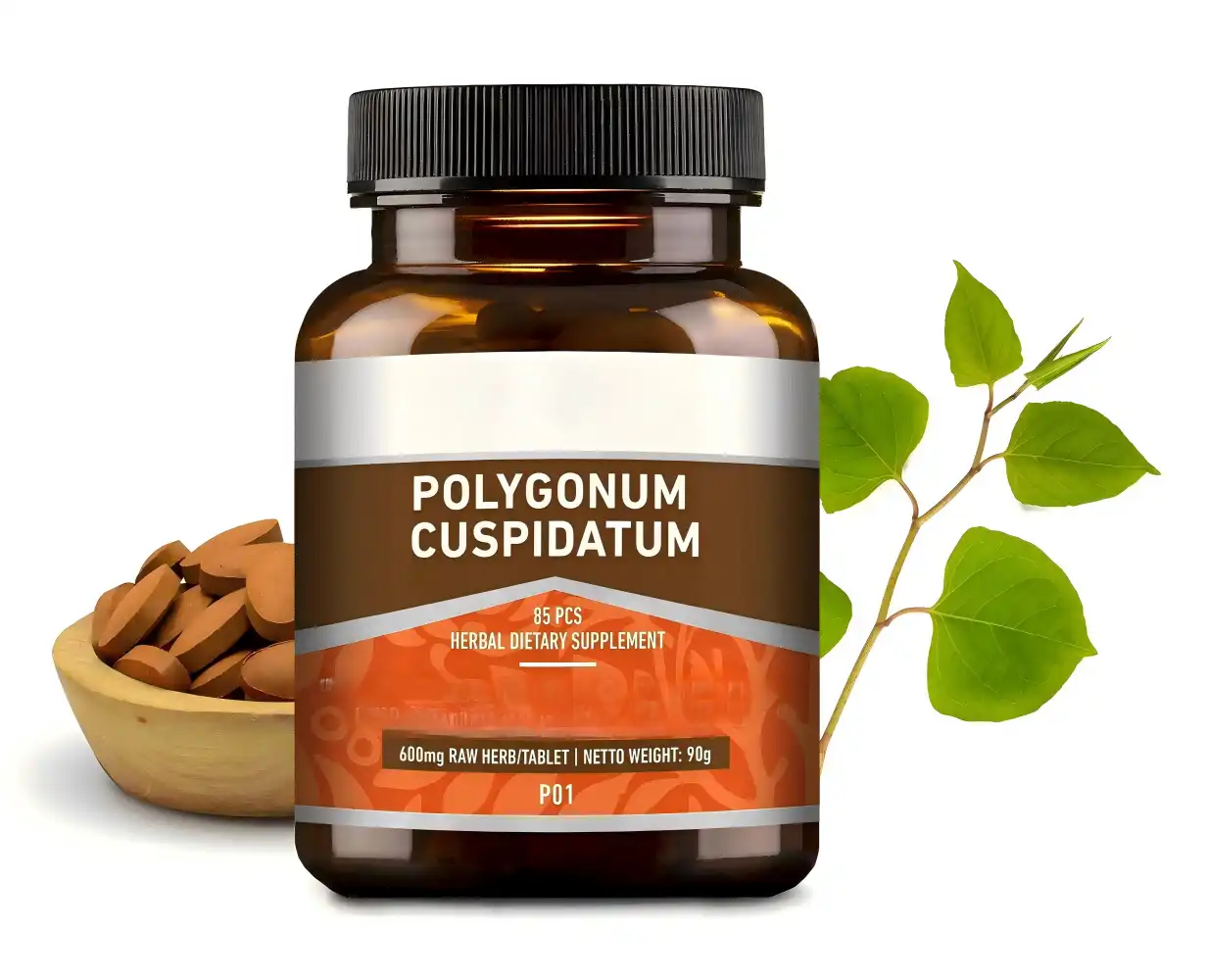Why choose Polygonum Cuspidatum 98% Resveratrol for inflammation?
In the quest for effective natural remedies to combat inflammation, Polygonum Cuspidatum 98% Resveratrol has emerged as a powerful contender. This high-purity extract, derived from Japanese knotweed (Polygonum cuspidatum), offers a potent source of trans-resveratrol, a compound renowned for its anti-inflammatory and antioxidant properties. As chronic inflammation continues to be a significant health concern, linked to various diseases and age-related conditions, the demand for safe and effective anti-inflammatory agents has never been higher. Polygonum Cuspidatum 98% Resveratrol stands out as a premium natural solution, backed by scientific research and offering a myriad of health benefits beyond inflammation control. This blog explores the compelling reasons why this extract is becoming the go-to choice for those seeking to manage inflammation and promote overall well-being through natural means.

The Science Behind Its Potent Anti-Inflammatory Mechanism and Antioxidant Benefits
Molecular Mechanisms of Resveratrol's Anti-Inflammatory Action
Polygonum Cuspidatum 98% Resveratrol exerts its anti-inflammatory effects through multiple molecular pathways. Research has shown that resveratrol inhibits key inflammatory mediators such as NF-κB, a transcription factor that plays a crucial role in the inflammatory response. By modulating NF-κB activity, resveratrol effectively reduces the production of pro-inflammatory cytokines like TNF-α and IL-6. Additionally, Polygonum Cuspidatum 98% Resveratrol has been found to inhibit COX-2 enzyme activity, which is responsible for the production of inflammatory prostaglandins. This multifaceted approach to inflammation suppression makes it a versatile and powerful tool in managing various inflammatory conditions, from arthritis to cardiovascular diseases.
Antioxidant Properties and Their Role in Reducing Oxidative Stress
One of the key reasons why Polygonum Cuspidatum 98% Resveratrol is highly valued in anti-inflammatory strategies is its potent antioxidant capacity. Oxidative stress, characterized by an imbalance between free radicals and antioxidants in the body, is a major contributor to chronic inflammation. Resveratrol acts as a powerful scavenger of free radicals, neutralizing these harmful molecules before they can cause cellular damage. Moreover, it enhances the body's natural antioxidant defenses by activating enzymes like superoxide dismutase and catalase. This dual action of direct free radical scavenging and boosting endogenous antioxidant systems makes Polygonum Cuspidatum 98% Resveratrol an exceptionally effective agent in combating oxidative stress-induced inflammation.
Synergistic Effects with Other Bioactive Compounds
The efficacy of Polygonum Cuspidatum 98% Resveratrol in managing inflammation is further enhanced by its synergistic interactions with other bioactive compounds naturally present in the extract. While resveratrol is the primary active component, Polygonum cuspidatum also contains other polyphenols and flavonoids that contribute to its overall anti-inflammatory effect. These compounds work in concert with resveratrol, potentially amplifying its benefits and providing a more comprehensive approach to inflammation control. This synergy not only enhances the anti-inflammatory action but also offers a broader spectrum of health benefits, making Polygonum Cuspidatum 98% Resveratrol a holistic solution for inflammation-related health concerns.
Exploring Polygonum Cuspidatum Extract as a Potent Natural Alternative for Inflammatory Support
Comparison with Synthetic Anti-Inflammatory Agents
When comparing Polygonum Cuspidatum 98% Resveratrol to synthetic anti-inflammatory drugs, several advantages become apparent. Unlike many pharmaceutical options that often come with a host of side effects, especially with long-term use, Polygonum Cuspidatum extract offers a natural alternative with a favorable safety profile. The 98% purity of resveratrol ensures potent anti-inflammatory action without the risk of adverse effects commonly associated with NSAIDs or corticosteroids. Moreover, while synthetic drugs typically target a single pathway, Polygonum Cuspidatum 98% Resveratrol addresses inflammation through multiple mechanisms, potentially offering more comprehensive and sustainable relief. This multi-faceted approach not only helps in managing inflammation but also supports overall health and wellness.
Clinical Evidence Supporting Its Efficacy
The efficacy of Polygonum Cuspidatum 98% Resveratrol in managing inflammation is not just theoretical but is backed by a growing body of clinical evidence. Numerous studies have demonstrated its ability to reduce inflammatory markers in various conditions. For instance, research has shown significant reductions in C-reactive protein (CRP) levels, a key indicator of systemic inflammation, in subjects supplementing with high-purity resveratrol. Additionally, clinical trials focusing on specific inflammatory conditions such as osteoarthritis and cardiovascular diseases have reported positive outcomes with Polygonum Cuspidatum extract supplementation. These findings underscore the potential of Polygonum Cuspidatum 98% Resveratrol as a viable and effective natural solution for inflammatory support across a range of health concerns.
Long-term Benefits and Safety Profile
One of the most compelling reasons to choose Polygonum Cuspidatum Extract 98% for inflammatory support is its excellent long-term safety profile. Unlike many synthetic anti-inflammatory agents that may pose risks with prolonged use, Polygonum Cuspidatum extract has been shown to be well-tolerated even with extended supplementation. This makes it an ideal choice for managing chronic inflammatory conditions that require ongoing support. Furthermore, the long-term benefits extend beyond just inflammation control. Regular use of high-purity resveratrol has been associated with improvements in overall cardiovascular health, cognitive function, and metabolic parameters. This multifaceted approach to health makes Polygonum Cuspidatum 98% Resveratrol an attractive option for those looking to address inflammation while simultaneously supporting their overall well-being in a natural, sustainable manner.
A Guide to Using Resveratrol for Joint Health and Cellular Antioxidant Protection
Optimal Dosage and Administration for Maximum Benefits
To harness the full potential of Polygonum Cuspidatum 98% Resveratrol for joint health and cellular antioxidant protection, proper dosage and administration are crucial. While optimal dosages can vary depending on individual needs and specific health conditions, research suggests that doses ranging from 100 to 500 mg per day are effective for most adults. For joint health specifically, higher doses within this range may be more beneficial. It's important to note that the high purity of our 98% resveratrol extract allows for lower dosages compared to less concentrated forms. For best absorption, it's recommended to take Polygonum Cuspidatum 98% Resveratrol with a meal containing some fat, as resveratrol is fat-soluble. Consistency is key – regular daily supplementation is typically more effective than sporadic use for maintaining joint health and cellular antioxidant protection.
Synergistic Combinations for Enhanced Effectiveness
While Polygonum Cuspidatum Extract is potent on its own, its effectiveness can be further enhanced when combined with complementary nutrients. For joint health, pairing resveratrol with glucosamine and chondroitin can provide comprehensive support for cartilage health and inflammation reduction. When focusing on cellular antioxidant protection, combining Polygonum Cuspidatum 98% Resveratrol with other powerful antioxidants like vitamin C, vitamin E, and quercetin can create a synergistic effect, offering more robust protection against oxidative stress. Some studies also suggest that combining resveratrol with curcumin, another potent natural anti-inflammatory compound, can lead to enhanced anti-inflammatory effects. These strategic combinations can maximize the benefits of Polygonum Cuspidatum 98% Resveratrol, providing a more comprehensive approach to managing inflammation and supporting overall health.
Lifestyle Factors to Maximize Resveratrol's Effects
To fully capitalize on the benefits of Polygonum Cuspidatum 98% Resveratrol, it's important to consider complementary lifestyle factors. A diet rich in antioxidants and low in processed foods can enhance the anti-inflammatory effects of resveratrol. Regular exercise, particularly moderate-intensity activities, can work synergistically with resveratrol to reduce inflammation and improve overall health. Adequate sleep and stress management are also crucial, as chronic stress and sleep deprivation can counteract the anti-inflammatory benefits of resveratrol. Additionally, limiting alcohol consumption and avoiding smoking can help maintain the effectiveness of Polygonum Cuspidatum 98% Resveratrol in providing cellular antioxidant protection. By integrating these lifestyle factors with regular supplementation of high-purity resveratrol, individuals can create a comprehensive approach to managing inflammation, supporting joint health, and enhancing overall cellular protection.
Conclusion
Polygonum Cuspidatum 98% Resveratrol emerges as a powerful, natural solution for managing inflammation and promoting overall health. Its potent anti-inflammatory and antioxidant properties, backed by scientific research and clinical evidence, make it an excellent choice for those seeking effective, natural alternatives to synthetic drugs. With its high purity, versatile applications, and favorable safety profile, this extract offers a comprehensive approach to addressing various health concerns, from joint health to cellular protection. As we continue to uncover the full potential of resveratrol, Polygonum Cuspidatum 98% Resveratrol stands out as a promising ally in the pursuit of better health and well-being.
Boost Your Formulations with Avans Premium Resveratrol Today
At Avans NutriHealth Co., Ltd., we are committed to providing high-quality plant extracts and nutritional supplements. Our Polygonum Cuspidatum 98% Resveratrol is produced under stringent quality control measures, ensuring purity and efficacy. With our extensive R&D capabilities and state-of-the-art manufacturing facilities, we can meet diverse customer needs and offer customized solutions. Our team of experts is dedicated to delivering exceptional products and support. For more information or to discuss how our Polygonum Cuspidatum 98% Resveratrol can benefit your formulations, please contact us at Lillian@avansnutri.com. Choose Avans NutriHealth for premium quality and reliable service in your journey towards innovative health solutions.
FAQ
Q: What is Polygonum Cuspidatum 98% Resveratrol?
A: It's a high-purity extract from Japanese knotweed, rich in trans-resveratrol, known for its potent anti-inflammatory and antioxidant properties.
Q: How does Polygonum Cuspidatum 98% Resveratrol combat inflammation?
A: It inhibits inflammatory mediators like NF-κB and COX-2, while also scavenging free radicals and boosting the body's natural antioxidant defenses.
Q: Is Polygonum Cuspidatum 98% Resveratrol safe for long-term use?
A: Yes, it has an excellent safety profile and is well-tolerated even with extended use, unlike many synthetic anti-inflammatory drugs.
Q: What's the recommended dosage of Polygonum Cuspidatum 98% Resveratrol?
A: Typically, doses range from 100 to 500 mg per day, but it's best to consult with a healthcare professional for personalized advice.
Q: Can Polygonum Cuspidatum 98% Resveratrol be combined with other supplements?
A: Yes, it can be combined with other antioxidants or joint health supplements for enhanced effectiveness.
References
1. Baur, J.A., & Sinclair, D.A. (2006). Therapeutic potential of resveratrol: the in vivo evidence. Nature Reviews Drug Discovery, 5(6), 493-506.
2. Chu, X., et al. (2019). Resveratrol and Inflammation: Challenges in Translating Pre-clinical Findings to Improved Patient Outcomes. Biochimica et Biophysica Acta (BBA) - Molecular Basis of Disease, 1865(6), 1647-1662.
3. de Sá Coutinho, D., et al. (2018). Resveratrol: A Potential Therapeutic Drug for Inflammatory Diseases. Current Pharmaceutical Design, 24(14), 1558-1570.
4. Smoliga, J.M., et al. (2011). Resveratrol and health – A comprehensive review of human clinical trials. Molecular Nutrition & Food Research, 55(8), 1129-1141.
5. Tung, B.T., et al. (2015). Anti-inflammatory effect of resveratrol in old mice. Biomedical Reports, 3(6), 854-857.
6. Xia, N., et al. (2017). Antioxidant effects of resveratrol in the cardiovascular system. British Journal of Pharmacology, 174(12), 1633-1646.



